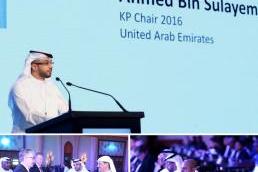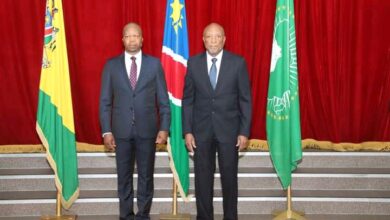Kimberley process plenary meeting in Dubai set to decide on historic initiatives

Principal topics to include Permanent UN Secretariat and Independent NGO FundKeynote addresses to be delivered by H.E. Abdullah Al Saleh, Undersecretary for Foreign Trade & Industry, UAE Ministry of Economy; Ahmed Bin Sulayem, UAE Kimberley Process Chair; and Andrey Polyakov, President of the World Diamond Council
Dubai, UAE: The UAE Kimberley Process Chair (KP Chair), Ahmed Bin Sulayem and the UAE Ministry of Economy, will host the annual plenary event of the global initiative scheduled to take place in Dubai on November 13 – 17 at The Westin Al Habtoor. Participants representing 81 countries will meet to discuss a number of issues vital to the future of the KP and stakeholders of the diamond supply chain across the world.
The week-long event will feature addresses from His Excellency Abdullah Al Saleh, Undersecretary for Foreign Trade & Industry at the UAE Ministry of Economy; Ahmed Bin Sulayem, UAE Kimberley Process Chair; and Andrey Polyakov, President of the World Diamond Council. It will conclude with the handover process to the representatives of the Australian government for the 2017 KP Chairmanship.
As the first Arab country chosen to Chair the process – a collaborative initiative between governments, industry officials and civil society to stem the flow of conflict diamonds globally – the UAE has proposed a number of developments directed at strengthening the KP’s mandate. These include the proposal to establish a Permanent Secretariat for the KP under the United Nations, as well as creating an independent fund for NGOs involved in the initiative.
“Over the past decade, the Kimberley Process has played a landmark role in establishing a safe environment and promoting ethical business practices for people in the diamond industry to whom it matters the most – miners across source markets in Africa,” said Mr. Bin Sulayem. “In this way, we have worked towards creating an environment that will facilitate the sustainable growth of the industry and deliver fair value to everyone in the supply chain. Nonetheless, this is an ongoing journey where more needs to be done and by deciding upon these two proposals at the plenary this year, we strongly believe the KP will take a significant step forward in strengthening its foundation.”
While the KP has proved to be highly effective in inhibiting the flow of conflict diamonds across borders, it remains far more challenging to bring the respective nations back into the process once the issues are resolved, which has a significant impact on the livelihoods of miners. The UAE KP Chair’s proposal to establish a Permanent Secretariat under the UN, with funding from diamond consuming nations and led by an African national with in-depth knowledge of the process, will ensure this work is carried out in a structured manner with dedicated and traceable resources.
“Based on our experience with the Central African Republic, where diamond exports had stopped until we took over the KP CAR Monitoring Team and ensured zones were compliant for exports, we know that it is essential to put a more systematic approach into place under a credible body such as the UN,” added Mr. Bin Sulayem. “The proposal for an independent fund also centers on the issue of transparency as it will allow African NGOs to participate on equal terms in Review Visits and Missions, as well as KP Intersessional and Plenary Meetings as Observers without any undue control by Industry or any individual member of Civil Society.”
The proposal for the independent fund will be decided upon at the plenary and, if approved, it will then be adopted by the UN General Assembly by the end of the year. The UAE KP Chair has called for it to be financed by industry bodies in the diamond trade in order to effectively harness the Civil Society’s potential.
Among these issues, the plenary will also focus on rough diamond valuation and addressing the growing synthetic diamond industry.
Over the past year, the UAE KP Chair has enacted a number of directives, seeing him move away from the traditional approach to take on a more hands-on role. In addition to beginning the process of bringing Venezuela back into the fold, through the ‘Africa Initiative’ there has been significant progress made in engaging governments across the continent. Mr. Bin Sulayem has held successful meetings with CAR, Angola, South Africa, Burkina Faso, Democratic Republic of Congo, Ghana, Zimbabwe, Namibia, Uganda, Rwanda, Burundi, Mozambique and Lesotho.
Working together with the OECD and AWDC, the KP Chair also initiated a series of dedicated workshops on rough diamond valuation, one of the key issues facing the industry. Looking to the future, the possibility of using Blockchain technology to create a seamless and continued global process for the KP has also been introduced.
Mr. Bin Sulayem concluded, “I am honored to have been given the opportunity to contribute to the sustainable development of the diamond industry as KP Chair, and while we have made extensive progress over the past year, we are confident that the discussions at the plenary will allow us to take further bold steps. We look forward to welcome and collaborate with all participants here in Dubai next week to engender positive change and progress for the future.”
-Ends-
Media Enquiries:
E: [email protected]
M: +971 50 127 6709
About the Kimberley Process Certification Scheme
The Kimberley Process Certification Scheme is a collaborative initiative between governments, industry and civil society to stem the flow of conflict diamonds into the diamond trade. Started in 2000, the creation of the Kimberley Process Certification Scheme (KPCS) in November 2002 laid the foundation for the KPCS by setting out the requirements for controlling rough diamond production and trade. It entered into force in 2003, when participating countries started to implement the rules. There are now 54 participants representing 81 countries including the UAE.
In 2003, the UAE adapted its Federal Law “Union Law no.13 Regarding Supervision of Import/Export and Transit of Rough Diamonds” and became the first Arab country to implement the Kimberley Process Certification Scheme. The Kimberley Process office in DMCC is the entity authorised by the UAE Ministry of Economy to authenticate the ethical sourcing of rough diamonds traded in the country.




